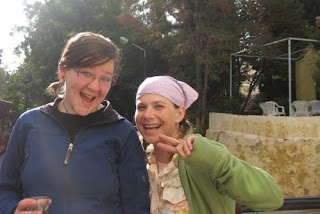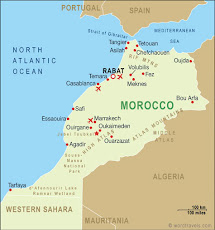“I have been standing on the side of life, watching it float by. I want to swim in the river. I want to feel the current.”– from “Loving Frank” by Nancy Horan
 Candace on the steps outside her host family’s dar.
Candace on the steps outside her host family’s dar.
I hadn’t realized just how much I was craving it until I received the surprise gift of a day to myself.
My host family went to the nearby city of Fes on Sunday, our only day off from learning and teaching. Most of the kids in my group went to Fes with their own host families. I figure I have two years to visit this ancient city, so I wasn’t disappointed not to be invited.
Instead, I was so looking forward to a hike into the gorgeous, pine-covered mountains surrounding our little city. But a heavy rain canceled those plans.
What a treat. Alone, completely alone, for the first time in nearly two months. I rolled over and slept a couple more hours – until the luxurious hour of 9 a.m. I took the longest, hottest bath I’ve had in ages. I made my own lunch, much as I would have enjoyed on a Sunday afternoon back home – a baguette with soft cheese, some cashews, a couple of apples. I read; I watched a few episodes of “Weeds” on my iPod; I wrote and wrote and wrote (somehow, despite our jam-packed days, I’ve been journaling my ass off, and my stagemate Trish and I have formed a two-woman writing group via email that I hope will help me get over my writing fears).
’Twas heavenly … though I had to fight feelings of guilt for thinking so.
It’s not that I don’t enjoy spending time with my host family, or the many other Moroccans I’ve befriended so far. It’s just that I’m used to a significant amount of “alone time” to recharge my mental batteries, so to speak. I long for a couple of hours at Meadowlark or Jones Coffee, alone in the company of other funky beatniks. Or to stretch out on a banquette in the parlor, Billie Holiday on the stereo, with a good novel (or even my homework!) and a cup of tea and no one rushing in and out asking Labas? Labas? Kulshi bixir? (“Are you OK? Is everything alright?”)
Voluntary solitude is not a concept here. The idea of going to hang out at a coffeehouse, alone in a crowd, armed with soy latte and iPod and paperback and wifi, as an enjoyable activity – it’s unthinkable.
(Then, of course, there’s the opinion here of the type of woman who goes to a café, whether unaccompanied or not … that’s a whole issue I need to mull over in my head a bit more before I can write about it.)
Life is family-centered here. Any free time is spent visiting loved ones in each others’ homes, to share meals and gossip and opinions … or simply to watch TV together. It’s nice to feel part of a family, especially when my own is so far away. I just need to balance their company with my own cultural needs.
Unscripted.
I’ve hit my learning wall – and it’s a wall built of Arabic script. My CBT group (affectionately self-dubbed the “short bus” class) is the last one to begin learning script. We’ve been learning Darija via transliteration – using Roman letters to approximate the sounds the language makes. Most Moroccans can read transliteration because of their fluency in French (the country was occupied by France for the first half of the 20th century).
Lahcan, our intrepid and ever-patient language instructor, started introducing us to script last week. A couple of my classmates had already been learning on their own. The others seem to be picking it up, shwiya b shwiya.
But my own brain is at capacity. It’s all I can do to keep a few new words or conjugations in my head every day. I’m following along during the script lessons, but I’m not really picking anything up – and I’m not at all worried about it, either.
For me, the goal is communication. I don’t need to write in script; I need to be able to share plans, thoughts and ideas with my fellow Moroccans. Right now I spend most of my time feeling tongue-tied and wordless at best, just plain stupid much of the time. My mental energy is better focused on pronunciation, conjugation and comprehension.
When we reach our permanent sites, we’ll have individual tutors to continue our Darija lessons. Inshallah, I’ll learn some script down the road.
And while it’s easy to be frustrated by how much more there is yet to learn, it’s important to celebrate how far we’ve come. A month ago I was flipping frantically through my phrasebook just to cobble together “Food good. I go sleep now. Thank much.” Now I’m able to form entire sentences, in present, past or future tense, with an adjective thrown in every now and again if I’m feeling particularly on top of my game. It may take me a minute remember the correct conjugation, and I may need to put my mad mime skills to the test, but I can get my point across. That’s progress.
The blonde leading (?) the non.
In addition to our morning Darija classes, we’ve begun teaching English at the dar chebab. Five classes a week, supposedly for beginner, intermediate and advanced levels – but some youths are so eager that they just show up for all sessions. It’s not easy to corral 30 students of all ages and skill levels and leave them with anything of substance.
I’ve never taught before, at least not formally. The lack of training we’ve received in this area is frustrating, to say the least. I’m not exactly a fly-by-the-seat-of-my-pants kind of girl, in case you don’t know. Once “training” is over, I expect to be spending a significant amount of time researching lesson plans online and teaching myself how to teach.
Add to that the fact that I got into this not to teach English, but to help young people realize their own potential.
Progress is slow on that front as well.
Our youth group at the dar chebab is gearing up for our final activity before we have to leave. They came up with a pretty big plan: Spend a couple of afternoons at local mdrassas, or primary schools, teaching about the environment and leading a cleanup activity, followed by a morning of related skits and games this weekend to promote environmental issues and draw more youths to the dar chebab.
The process has been … a learning opportunity, for the youths but especially for us. They had a big plan, and we let them run with it when they seemed to have all their bases covered – ideas, execution, materials, permissions, etc.
Now we’re kind of relegated to the sidelines, thanks in equal measure to the language barrier, our reluctance to take over, and the amount of time available. The project has become less about the environment and more about entertainment. It’s been great to see them these young adults take charge of a project; they have good leadership and organizational skills and deserve a way to use them. But next time, we need to do a better job of helping them channel and focus their energies and abilities.
Heading home: A wish list.
We leave our CBT town in a week and return to Azrou to find out our permanent sites – where each of us will be living and working for the next two years. Then a week visiting our sites, meeting the host family and the current volunteer and learning our way around town. Another week or so, and believe it or not we’ll be sworn in as authentic PCVs (see the new glossary at left) on Nov. 20. That’s less than a month away.
A little anxious to learn where I’m being sent. Will I be freezing all winter? Will the dar chebab be active, or vacant? Will I be able to make a comfortable home for myself? Will I ever be able to carry on an intelligible conversation, much less an intelligent one?
In anticipation, I’ve made a sidebar (at left) of things I could really, really use if anyone were inclined to send a care package. I won’t be posting my permanent address on the blog – for security reasons, we’re not to make our specific whereabouts public – but if you want my address/phone number, just send me an email.
Shwiya homesick: A new playlist.
How to Be Invisible / Kate Bush
Somewhere In Between / Kate Bush
Trav’lin’ All Alone / Billie Holiday
Ramblin’ (Wo)man / Cat Power
Will You Miss Me When I’m Gone / June Carter Cash
Trouble In Mind / Janis Joplin
Ghost Of Yesterday / Billie Holiday
The Littlest Birds (Sing the Prettiest Songs) / The Be Good Tanyas
One Voice / The Wailin’ Jennys
Why Wasn’t I More Grateful (When Life Was Sweet) / Maria McKee
Downward Spiral / Sarah Benck And The Robbers
Poor Girl’s Blues / Jolie Holland
Subterranean Homesick Alien / Radiohead
If I Were A Weapon / Suzanne Vega
But I Feel Good / Groove Armada
I Could Stay Here Forever / Frank Black
The Whole World Lost Its Head / The Go-Go’s
Everything Will Be Alright / The Killers
More Adventurous / Rilo Kiley
Fumbling Towards Ecstasy / Sarah McLachlan
Quote of the day.
“You are herbivore? But you are very fat!”
– A visiting relative staying with my host family, during a discussion (in Darija/French/English) about why I don’t eat meat. It was absolutely intended as a compliment. Still …
More photos from our CBT site.
 Afternoon at a mdrassa
Afternoon at a mdrassa
 You can take me out of the journalism business, but …
You can take me out of the journalism business, but …
 … you can’t teach me to read Arabic newspapers
… you can’t teach me to read Arabic newspapers  Logan lets himself be traced …
Logan lets himself be traced …
 … so we can label body parts in Darija class
… so we can label body parts in Darija class
 Friday is couscous day!
Friday is couscous day!
 Truck stop
Truck stop  Grainy, but this one’s for Dad
Grainy, but this one’s for Dad









